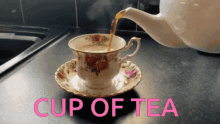Clock That Tea: Unpacking Meanings And Traditions
Have you ever stopped to think about the phrases we use every day? It's almost as if some words carry a whole world of stories within them, just waiting for us to uncover them. We often say things without really knowing where they come from, or what layers of meaning they might hold. Today, we're going to talk about a phrase that has popped up in conversations, a term that truly makes you pause and think: "clock that tea." It's a phrase that brings together a sense of awareness and a dash of something quite interesting, something perhaps a little bit gossipy, you know?
The idea of "clocking" something, in this sense, means to bring it to everyone's attention, or to talk about things people usually keep quiet about. It’s about shining a light on something that might be hidden or overlooked. And then there's "tea," which, as many of us know, refers to drama or something spicy, a piece of news that gets people talking. The spelling is "tea," but it's often used interchangeably with just "t." So, when we put these two ideas together, "clock that tea" becomes a way of highlighting something noteworthy, maybe even a little scandalous, for all to see. It’s a very modern way of speaking, yet it has roots that go back further than you might guess.
The origins of "tea" as a term for gossip or interesting news, according to some, stretch back to older times. People, often women, would gather for tea, and during these get-togethers, they would share stories and bits of news. It was a time for connection, for swapping tales, and yes, for a bit of chatter. This tradition, you see, has woven itself into our language in ways we might not even realize. It's fascinating how a simple drink and a social custom can shape the way we talk about things, isn't it?
Table of Contents
- Unraveling the Phrase: "Clock That Tea"
- The Tea Break Through History
- Social Commentary and the Act of Clocking
- The Magic of Afternoon Tea and Its Flavors
- Hidden Details in Life and Language
- Frequently Asked Questions About Tea and Language
- Bringing It All Together
Unraveling the Phrase: "Clock That Tea"
When we say "clock that tea," it’s more than just a catchy phrase; it’s a call to notice something important, or perhaps something juicy. The word "clock," in this context, means to draw attention to something, to make it visible to everyone. It's about speaking up about things that people don't usually discuss openly. This usage is rather distinct from telling time, as you can tell. It's about observation and then sharing what you've observed, which is quite a powerful thing to do, really.
Then we have "tea," which, as we touched on, stands for drama or something that's quite spicy in terms of news. This connection to gossip or interesting tidbits is deeply rooted in social gatherings. Think about it: when people get together, they often share what’s going on, and sometimes that includes a bit of drama. The term "tea" has become a shorthand for these kinds of conversations, making it easy to refer to exciting news without saying too much, in a way. It’s a very clever use of language, if you ask me.
The idea that "tea" comes from times when women would gather for tea is a widely held belief, and it makes a lot of sense. These gatherings were social hubs, places where stories were exchanged, and community bonds were strengthened. It was a time for sharing, and naturally, that included the latest happenings. This historical background adds a lot of depth to the modern slang term, showing how words can evolve yet still carry echoes of their past uses. It’s pretty neat how that works, don't you think?
The Tea Break Through History
The concept of a "tea break" is something many of us understand, a moment to pause and refresh. Historically, there were actual devices that tied into this idea, making tea part of a daily rhythm. One such device was an alarm clock that actually brewed tea when it went off. Imagine waking up to the gentle whirring and the comforting smell of freshly made tea right by your bed. This was a real thing, a device called a 'teasmade' that was quite popular in the UK during the 1960s and 1970s. It ensured your tea was ready the moment you opened your eyes, which sounds like a dream to many tea lovers, doesn't it?
Then there's the other historical reference to tea breaks: the bell that would go off in factories to let staff know it was time for their tea break. This was a very practical way to manage schedules and give workers a much-needed pause. Both of these scenarios are real, though the factory bell signal for tea breaks doesn't happen much anymore, as you might expect. These examples show how deeply tea, and the breaks associated with it, are woven into the fabric of daily life and work history. It's a rather interesting contrast, isn't it, between the personal luxury of a teasmade and the communal signal of a factory bell?
These historical connections to tea breaks highlight how important these moments of pause were, and still are, for people. Whether it was a personal device brewing a morning cuppa or a loud bell signaling a collective rest, tea has long been linked to moments of respite and refreshment. It's a tradition that speaks to the need for a little break in our busy days, something we can all appreciate, I think. This connection between time, work, and a warm drink is quite a strong one, actually.
Social Commentary and the Act of Clocking
The act of "clocking" can also take on a more pointed social meaning, especially when it comes to how people observe and judge others. The text mentions how some cisgender people "clock" other cisgender people who might not look traditionally like their gender. This means they notice and comment on appearances that don't fit narrow expectations. It's a form of judgment, really, often based on outdated ideas about how someone "should" present themselves. This kind of observation, sadly, can lead to unfair treatment, you know?
It's interesting, and somewhat sad, that these actions often involve people oppressing their own kind. They seem to not care about the harm they cause, as long as they can express their dislike or disapproval. This "clocking" in a judgmental sense is about picking apart someone's appearance or mannerisms because they don't conform to what is considered "normal" or "traditional" for their gender. It's a way of policing others, which is never a good thing. This aspect of "clocking" is a much heavier topic than the lighthearted "tea" of gossip, obviously.
This behavior highlights a darker side of human interaction, where people use observation not to understand or appreciate, but to criticize and put down. It's a reminder that while language can be fun and playful, it can also be used to enforce harmful norms. The act of "clocking" in this context is about making someone else's perceived differences into a public spectacle, often with negative intent. It’s a very real part of social dynamics, unfortunately, and something we should be aware of, perhaps.
The Magic of Afternoon Tea and Its Flavors
Moving back to the more pleasant side of tea, let's talk about the delightful tradition of afternoon tea. The text fondly remembers "Four o’ clock tea" and how it used to have really yummy flavors with whimsical packaging. There's a real sense of loss mentioned, a sadness that they changed direction. This speaks to how much people connect with brands and products that offer a special experience, not just a simple item. The packaging, the taste, the whole vibe matters, doesn't it?
The desire for teas similar in flavor and quality to those old "Four o’ clock tea" varieties is quite strong. This shows a longing for a particular kind of sensory experience, something that brings back good memories or just offers a truly enjoyable moment. It's not just about the drink itself, but the entire feeling it evokes. Finding that perfect blend, that lovely aroma, and that satisfying taste can be a real quest for tea lovers, you see.
Historically, "five o'clock tea" was the standard time for afternoon tea, especially for the upper and middle classes. It was a daily meal, a proper event, not just a quick drink. If you read Victorian and Edwardian literature, you'll find many references to this tradition, showing how ingrained it was in daily life. It was a time for socializing, for dressing up, and for enjoying delicate treats alongside your brew. It's a very elegant picture, isn't it?
It's also interesting to note that countries that call it "five o'clock tea" don't always have such a tradition themselves. It's simply a common term they use to refer to the afternoon tea tradition that the British have. This shows how cultural practices can spread and be referred to, even if they aren't directly practiced everywhere. It's a way of acknowledging a well-known custom, almost like a nod to history, in some respects.
The evolution of tea traditions, from the grand afternoon affairs to the cozy teasmade, shows how tea has adapted to different lifestyles and times. Yet, the core appeal remains: a moment of warmth, flavor, and connection. The search for those specific, cherished flavors from the past is a testament to the lasting impact of good quality and thoughtful presentation. It’s a reminder that some things, like truly good tea, leave a lasting impression, you know?
Hidden Details in Life and Language
The text also mentions a love for how many details and hidden areas are in the game Kingdom Hearts 1 (KH1). It’s considered one of its strongest points compared to other games in the series. This appreciation for hidden depths and intricate design can be applied to many areas of life, including language itself. Just like a well-designed game has layers to uncover, so too do our words and phrases, like "clock that tea." It's a way of finding richness in unexpected places, which is quite satisfying, I think.
The fact that "a lot of people didn't know about" these details in KH1 speaks to how easy it is to miss the subtle complexities around us. The same goes for language. We use words and phrases constantly, but often without truly understanding their full background or the nuances of their meaning. Taking the time to look closer, to "clock" these hidden details, can open up a whole new level of appreciation. It's a bit like discovering a secret passage in a familiar place, isn't it?
This idea of uncovering hidden information connects back to the very meaning of "clock that tea." It’s about bringing something to light, something that might have been overlooked or not widely known. Whether it's a secret area in a game or the fascinating history behind a common saying, there's a joy in discovery. It encourages us to be more observant, to question, and to dig a little deeper into the things we encounter every day. This curiosity is a good thing, you know?
For more interesting facts about language and its origins, Learn more about words on our site. You might be surprised by what you find. The way words change and take on new meanings over time is a constant process, and understanding it can make our daily conversations even more interesting. It’s almost like watching a living thing grow and change, which is quite fascinating, if you ask me.
Frequently Asked Questions About Tea and Language
What does "clock" mean in the phrase "clock that tea"?
In this phrase, "clock" means to bring something to everyone's attention or to talk about something that people don't really discuss much. It's about noticing something and then making it known, which is quite different from its usual meaning of telling time, obviously.
Where does the term "tea" for drama come from?
The etymology of "tea" meaning drama or gossip, according to some, comes from older times when people, generally women, would gather for tea. These gatherings were social events where news and stories were shared, often including spicy or dramatic bits of information. It's a pretty old connection, you see.
What was a "teasmade"?
A "teasmade" was a popular device in the UK during the 1960s and 1970s. It was an alarm clock that also made tea, ensuring that a fresh cup was ready upon waking up. It was a very convenient and comforting invention for many people, providing a warm start to the day, in a way. You can learn more about its history here.
Bringing It All Together
So, we've taken a little trip through the many layers of "clock that tea." From its modern slang use to its historical echoes, this phrase, and the ideas around it, show just how rich and varied our language can be. We've seen how "clock" can mean to observe and reveal, and how "tea" carries the weight of gossip, social gatherings, and even historical tea breaks. It's a reminder that words are not just sounds; they are containers for history, culture, and human connection, which is quite amazing, actually.
Whether it’s the factory bell signaling a break, the cozy hum of a teasmade, or the shared stories over a cup of afternoon tea, this simple drink has played a significant role in our social fabric. And the act of "clocking" something, whether it's a piece of drama or a hidden detail in a beloved game, speaks to our natural human curiosity and our desire to share what we find. It’s all about noticing, isn't it?
We hope this exploration has given you a fresh perspective on a phrase you might hear often. It’s a good reminder to always look a little closer at the words we use and the traditions they represent. What other phrases do you think have hidden depths? Share your thoughts and observations with us, because we love to hear what you're thinking. It's a truly interesting topic, and there's always more to learn, you know?
External reference: Learn more about the Teasmade on Wikipedia.

Ticking Clock GIFs | Tenor

Tea Meme GIFs | Tenor

Hot Tea GIFs | Tenor